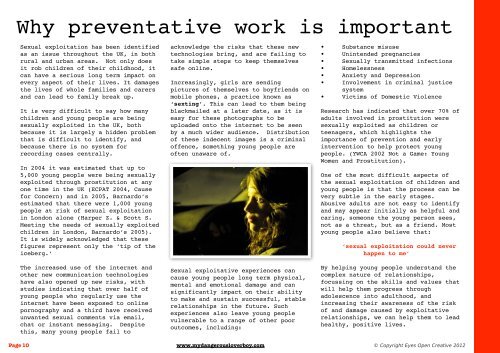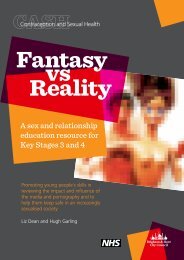Free Lesson Plan - Love or Lies? Education Resource Pack - FPA
Free Lesson Plan - Love or Lies? Education Resource Pack - FPA
Free Lesson Plan - Love or Lies? Education Resource Pack - FPA
Create successful ePaper yourself
Turn your PDF publications into a flip-book with our unique Google optimized e-Paper software.
Why preventative w<strong>or</strong>k is imp<strong>or</strong>tant<br />
Sexual exploitation has been identified<br />
as an issue throughout the UK, in both<br />
rural and urban areas. Not only does<br />
it rob children of their childhood, it<br />
can have a serious long term impact on<br />
every aspect of their lives. It damages<br />
the lives of whole families and carers<br />
and can lead to family break up.<br />
It is very difficult to say how many<br />
children and young people are being<br />
sexually exploited in the UK, both<br />
because it is largely a hidden problem<br />
that is difficult to identify, and<br />
because there is no system f<strong>or</strong><br />
rec<strong>or</strong>ding cases centrally.<br />
In 2004 it was estimated that up to<br />
5,000 young people were being sexually<br />
exploited through prostitution at any<br />
one time in the UK (ECPAT 2004, Cause<br />
f<strong>or</strong> Concern) and in 2005, Barnardo’s<br />
estimated that there were 1,000 young<br />
people at risk of sexual exploitation<br />
in London alone (Harper Z. & Scott S.<br />
Meeting the needs of sexually exploited<br />
children in London, Barnardo’s 2005).<br />
It is widely acknowledged that these<br />
figures represent only the ‘tip of the<br />
iceberg.’<br />
The increased use of the internet and<br />
other new communication technologies<br />
have also opened up new risks, with<br />
studies indicating that over half of<br />
young people who regularly use the<br />
internet have been exposed to online<br />
p<strong>or</strong>nography and a third have received<br />
unwanted sexual comments via email,<br />
chat <strong>or</strong> instant messaging. Despite<br />
this, many young people fail to<br />
acknowledge the risks that these new<br />
technologies bring, and are failing to<br />
take simple steps to keep themselves<br />
safe online.<br />
Increasingly, girls are sending<br />
pictures of themselves to boyfriends on<br />
mobile phones, a practice known as<br />
‘sexting’. This can lead to them being<br />
blackmailed at a later date, as it is<br />
easy f<strong>or</strong> these photographs to be<br />
uploaded onto the internet to be seen<br />
by a much wider audience. Distribution<br />
of these indecent images is a criminal<br />
offence, something young people are<br />
often unaware of.<br />
Sexual exploitative experiences can<br />
cause young people long term physical,<br />
mental and emotional damage and can<br />
significantly impact on their ability<br />
to make and sustain successful, stable<br />
relationships in the future. Such<br />
experiences also leave young people<br />
vulnerable to a range of other po<strong>or</strong><br />
outcomes, including:<br />
• Substance misuse<br />
• Unintended pregnancies<br />
• Sexually transmitted infections<br />
• Homelessness<br />
• Anxiety and Depression<br />
• Involvement in criminal justice<br />
system<br />
• Victims of Domestic Violence<br />
Research has indicated that over 70% of<br />
adults involved in prostitution were<br />
sexually exploited as children <strong>or</strong><br />
teenagers, which highlights the<br />
imp<strong>or</strong>tance of prevention and early<br />
intervention to help protect young<br />
people. (YWCA 2002 Not a Game: Young<br />
Women and Prostitution).<br />
One of the most difficult aspects of<br />
the sexual exploitation of children and<br />
young people is that the process can be<br />
very subtle in the early stages.<br />
Abusive adults are not easy to identify<br />
and may appear initially as helpful and<br />
caring, someone the young person sees,<br />
not as a threat, but as a friend. Most<br />
young people also believe that:<br />
‘sexual exploitation could never<br />
happen to me’<br />
By helping young people understand the<br />
complex nature of relationships,<br />
focussing on the skills and values that<br />
will help them progress through<br />
adolescence into adulthood, and<br />
increasing their awareness of the risk<br />
of and damage caused by exploitative<br />
relationships, we can help them to lead<br />
healthy, positive lives.<br />
Page 10 www.mydangerousloverboy.com © Copyright Eyes Open Creative 2012



